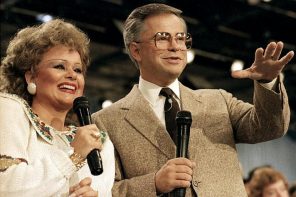On March 26 of this year, “The Church of Oprah Exposed” was posted on YouTube and has received, as of this writing, 5,916,675 views. At the heart of the video’s popularity is the allegation that the billionaire host of the most popular talk show in the history of television threatens Christianity and that she is, as LivePrayer.com’s Bill Keller believes, attempting to establish a cult. Keller, who likens Oprah’s views to “spiritual crack,” joins others in conservative Christian circles who point to comments of hers that have been floating around the Web for some time: “One of the mistakes that human beings make is believing that there is only one way to live… there couldn’t possibly be just one way [to God]…”
Asked by an audience member: “What about Jesus?”, Oprah responds: “What about Jesus?”
The current firestorm over Oprah’s religious status brings to mind a certain passage from the holy scriptures:
“You shall not make for yourself a graven image, or any likeness of anything that is in heaven above, or that is in the earth beneath, or that is in the water under the earth; you shall not bow down to them or serve them.”
The second of the Ten Commandments seems rather unequivocal, a clear statement that follows up the first commandment’s prohibition against worshiping other gods. The underlying message is straightforward for monotheists: do not worship other gods, or “bow down” to anything else in the cosmos.
The Ancient Israelites had the Golden Calf to lead them astray; twenty-first century conservative Christians have Oprah.
Christians should be very concerned about the Church of Oprah but not because of her so-called New Age tendencies and Christ-less spirituality, but because it’s part of a larger competing religious culture: celebrity worship. This pervasive religious culture is a nefarious threat to social stability and moral order, part of a secular wasteland that draws on traditional religious forms and attitudes but misplaces genuine spiritual longing in inappropriate, imprudent ways, according to the critics. Today, just as in biblical times, it is feared that idol worship draws people away from God and away from true spiritual fulfillment, providing momentary animal gratifications but putting the soul, and society itself, in mortal peril—or “spiritual crack,” in the parlance of our times.
Yet, even with the widespread public condemnations charging fans with practicing idolatry and showing signs of dangerous pathologies, or encouraging the spread of immorality and contributing to the decline of civilization, celebrities continue to embody and impart sacred realities—not seemingly sacred, nor pseudo sacred, nor false sacred, but just plain sacred realities—that fuel instructive mythologies, generate ritual practices, inspire personal transformations, and establish meaningful and practical values for fans who identify with Oprah and other cultural icons of our time.
Some may not like these icons and their persuasive powers. But like them or not, the power of fame and the spiritual dimensions of celebrity—a menace to some, salvation to others—constitutes a distinctive religious culture with wide-ranging communities of participants. This religious culture merges entertainment and devotional practices, commerce and sacred auras, in ways that transforms public and popular figures as well as fans themselves.
The apotheosis of Oprah is only one manifestation of this alternate form of sacred reality that is quite accommodating to those individuals who want to continue worshipping an invisible God in churches, synagogues, or temples while remaining devoted to the distant stars they keep firmly in their sights and intimately close in their hearts and minds. Like many of her fans, Oprah grew up in a household devoted to God, listening to and then learning to read from the bible, and worshipping Christ in the church, first with her mother and grandmother in Kosciusko, Mississippi, then with her father after she moved with him to Nashville, Tennessee. In the African American Progressive Baptist church her father served as a deacon and Oprah discovered the performer inside that loved to be in front of an audience.
Her fan base, of course, reaches far beyond the African American Christian communities that figure so prominently in the telling and retelling of her life story, encompassing Jews as well as Hindus, Muslims and Buddhists, New-Agers and atheists too, no doubt. Indeed, the particularities of Oprah’s individual life story are compellingly pertinent to millions of primarily but not exclusively female fans in America as well as the rest of the world.
They hear repeatedly of her personal tragedies and triumphs, challenges and commitments on websites and in books, television specials and magazines, in universal terms that many find deeply relevant to their own non-celebrity, ordinary lives—not quite hagiography in the traditional sense, but clearly sacred stories so familiar, so edifying, so archetypal for Americans of all stripes that they simultaneously personalize and canonize Oprah in the popular imagination.
From humble beginnings in rural Mississippi to media mogul with vast amounts of wealth and global power, Oprah’s extraordinary life is more than the sum of its parts to faithful fans. The struggles with poverty in her early years, abuse by relatives as a girl, diet and eating as an adult, and vicious critics for much of her career; her shape-shifting transformations in church as a young performer, in the media as an actor and talk-show host, in her physical appearance as a glamorous African American woman, in class standing from the lowest of the lows to billionaire status—all of the micro-details publicly consumed again and again do not add up to the banal “rags to riches” story so close to the hearts of Americans.
Rather, in the context of racism and sexism, corporate greed and personal misfortunes, the familiar elements of Oprah’s life and tremendous success as a celebrity with more to offer than entertainment to the masses is prime myth-making material, uplifting and instructive, gripping and weighty, to those who listen. Her story transcends the specific experiences related in writing, images, and speech, transformed for many from the simple life of an individual into an iconic tale of triumph and transformation with spiritual meanings that may or may not have anything to do with God but clearly consecrate this celebrity and make her worthy of veneration and emulation.
Oprah is more than a source for religious mythology in celebrity culture, however. She is also at the center of a range of devotional practices that demonstrate the depth and breadth of her religious standing in this prominent culture of worship. Watching Oprah’s talk show, reading her popular O magazine, buying the titles she includes in her book club, visiting her official website, oprah.com, journaling at her suggestion for greater self-awareness—these are only some of the ritual activities enacted in everyday life by millions of her followers.
But how can watching, reading, buying, visiting, journaling be religious ritual in this case when, in so many other circumstances, the same kinds of activity cannot be classified in a similar way? Are these deeply sacred bonds between an American idol and her star struck fans or consumer patterns manipulated by gross, profit-driven rationales to maximize earnings from this manufactured product?
Rituals are religious when they establish order for participants who return to them again and again, bind groups of disparate people into a unified community fixed on a common symbol or totem, empower individuals through expectations of personal transformation, transcendence, and fulfillment including but not limited to physical, embodied experiences, and teach followers about what is really real, especially meaningful, and genuinely insightful.
In the religious culture of celebrity, public figures like Oprah inspire individuals to engage in ritual actions that meet these requirements because fans adore her as an intimate authority of sacred, spiritual matters and trust her guidance through the ordinary, everyday struggles in their efforts to achieve the same degree of transcendence and transformation idealized in the mythology surrounding her personal life story.
Oprah is not the Pope, but as Vanity Fair, one of the primary sacred texts in celebrity religious culture, proclaimed in an article published over ten years ago, she may be a close second in terms of cultural authority in the personal lives of followers. As a recent book, The Gospel According to Oprah, argues quite convincingly, Oprah may indeed be considered the next Billy Graham, revivalist extraordinaire and twentieth-century national icon. Oprah is the nation’s premier religious revivalist for the twenty-first century, though with more of a Christ-less message than evangelical Graham, and no less infused with moral teachings, spiritual promises, and healing wisdom for the national, and now certainly global, masses.
Her non-sectarian, bible-influenced, spiritually-based therapeutic power to transform individuals and society itself was fittingly on display during America’s darkest hours after the 9/11 attacks. Oprah hosted the national memorial service after the tragedy, an intimate, familiar, trusted face who could lead Americans in the socially urgent rituals of death that did not exclude the expression of multiple religious traditions but, on the other hand, were sacred actions in their own right irrespective of the Christians, Jews, Buddhists, Muslims, and others who participated in the ceremonies.
Oprah is one of the wealthiest celebrities, but that does not detract from the spiritual authority that helps her to help others live a more fulfilling, meaningful life—a point made starkly clear in her presence at the memorial service. Indeed, her celebrity status and enormous wealth only reinforces her sacred standing in contemporary culture and her trustworthy voice in intimate matters of love and romance, forgiveness and generosity, empathy and self-understanding, truth and transcendence; it makes people believe that following her lead can help them “live your best life,” a familiar phrase to her fans but one that also sums up a fairly common goal in most religious traditions.
Is she a celebrity savior offering salvation not just from the trivialities and boredom of everyday life, but from suffering, injustices, and even death itself? Is the secret of salvation to become rich like her and live in opulence? Is it mere coincidence that her latest project, “Oprah’s Big Give,” involves the handing out of a large sums of money in “the most powerful and sensational ways to make a real difference”? Oprah cannot make all of her fans rich—a truly base, secular desire in and of itself—but she does offer the promise to make their lives better, salvation of a different sort than found in Christian doctrine, and one that surely blurs the lines between sacred transformation and psychological therapy, spiritual healing and healthy living.
Blurring these lines is confusing to most, but especially to those more conservatively positioned in relation to larger cultural trends and changes. The threat to God, and for many Christians, the fear that Jesus Christ is not the only truly divine celebrity, the sole source for true sacrality for the modern world, is an ongoing challenge to contemporary theology which has found itself increasingly displaced by, and ill-equipped to deal with, the Oprah phenomenon—let alone other pop cultural icons like Marilyn, Kurt, or Tupac. The confusion and fear over the commingling of sacred and secular, and the possibility that people have multiple religious identities and identifications, some of which do not require a monotheistic God, is expressed in public culture through diatribe and jeremiads, sermonizing and, in some cases, soul-searching reflection.
Besides Oprah, any number of celebrities can whip fans into a religious frenzy and demonstrate the sacred power of fame—Madonna or Brad Pitt, Johnny Depp and Anna Kournikova, all have legions of fan followers who find numerous ways to show their special commitments and spiritual allegiances. Whether it is building a shrine to Bob Dylan, or following the humanitarian lead of Angelina Jolie, as reported in Time magazine’s “The Year of Charitainment,” celebrities do something extraordinary to fans whose adoration is not simply analogous to religion, but is itself an example of religious activity. Seen from this perspective, Bill Keller and the makers of the Oprah video just may not turn out to be the “crazy Christians” that Hollywood uber-gossip Perez Hilton dismissed them as.




